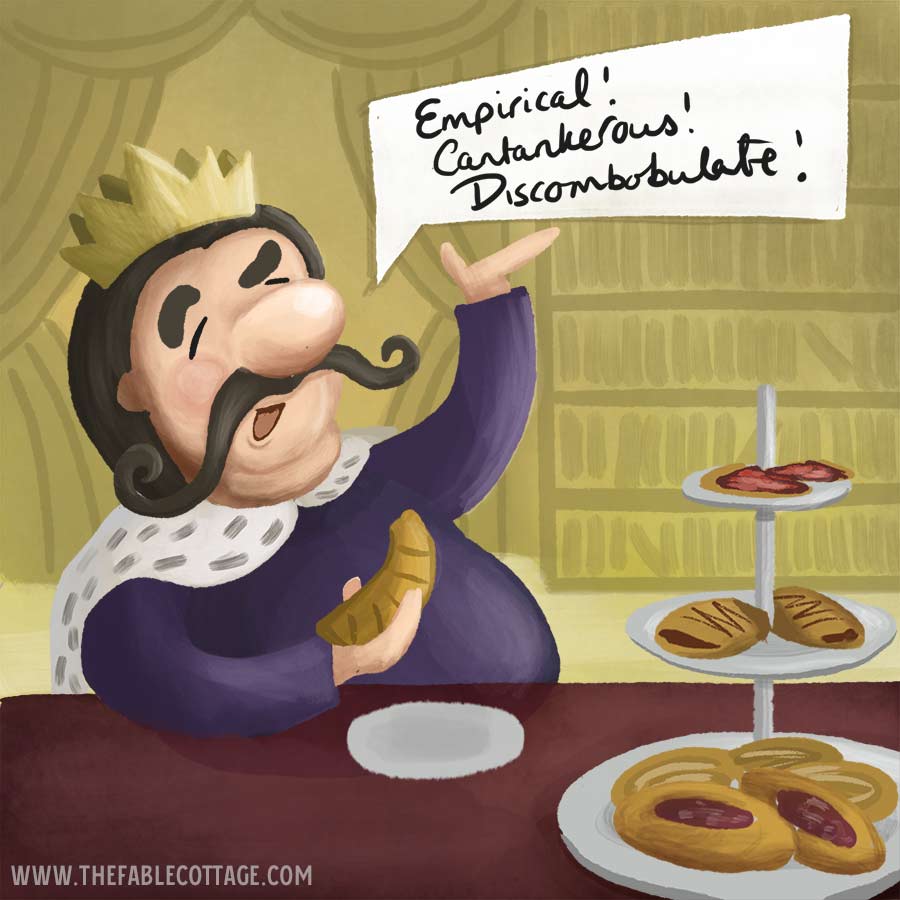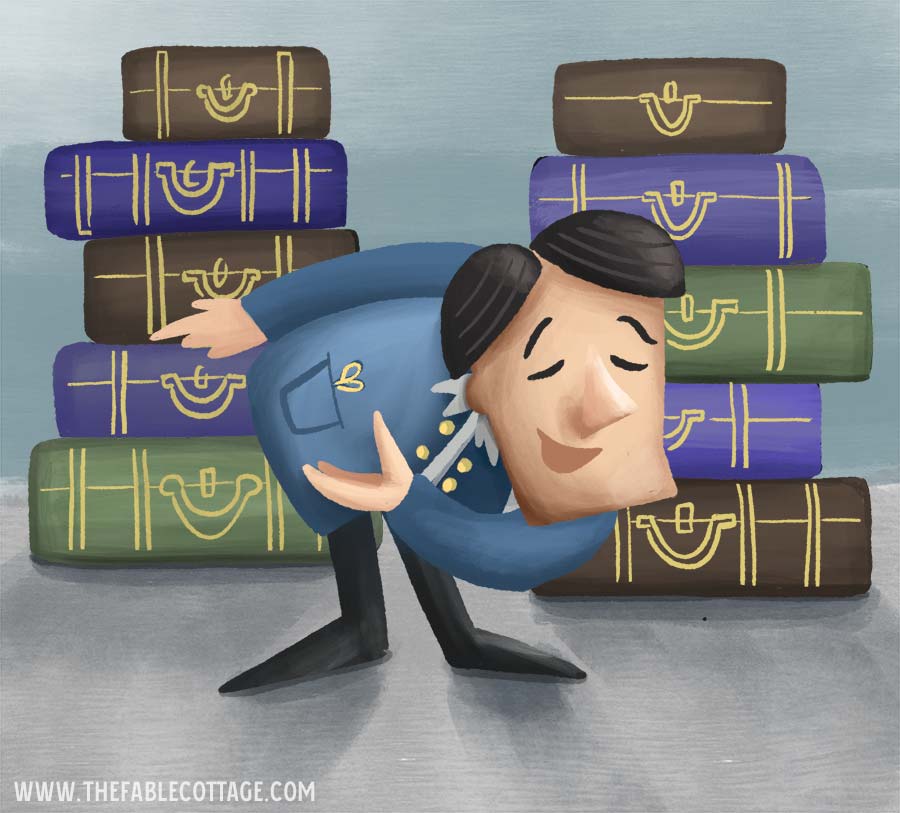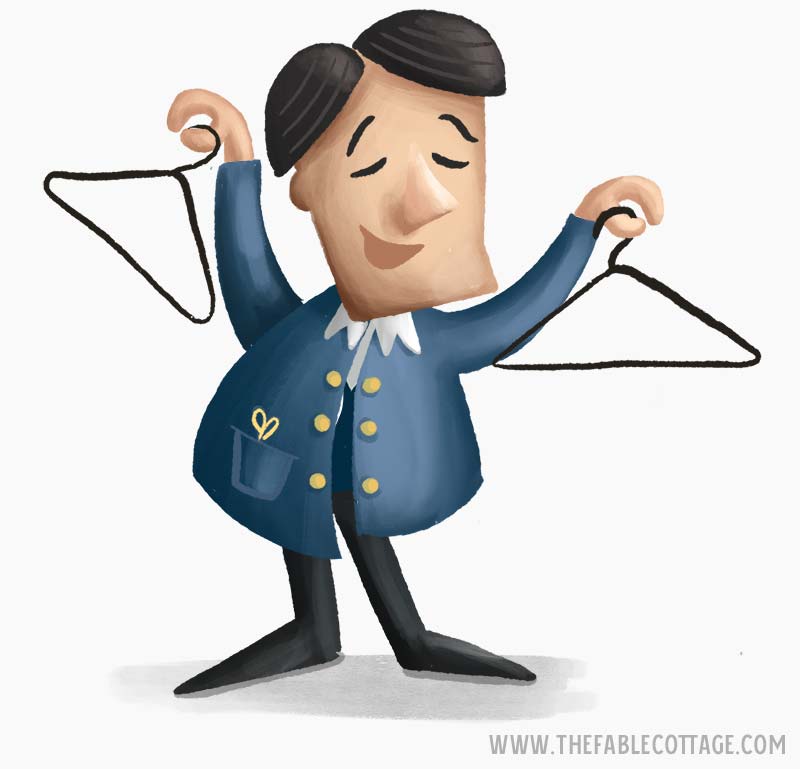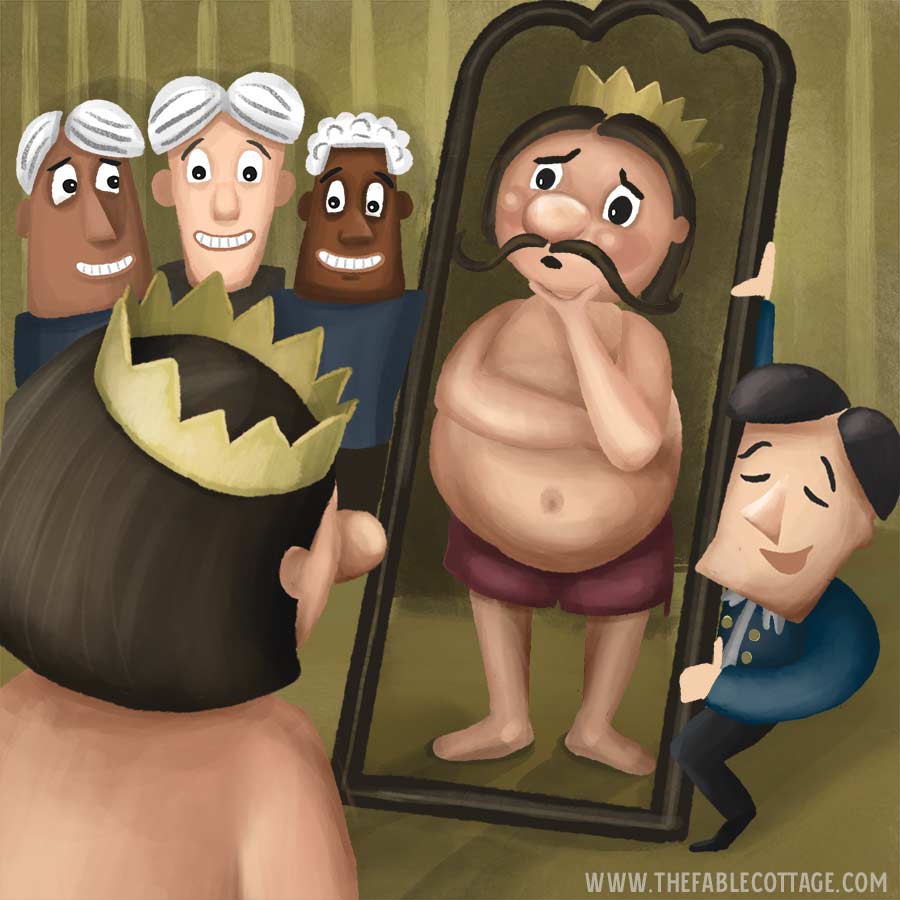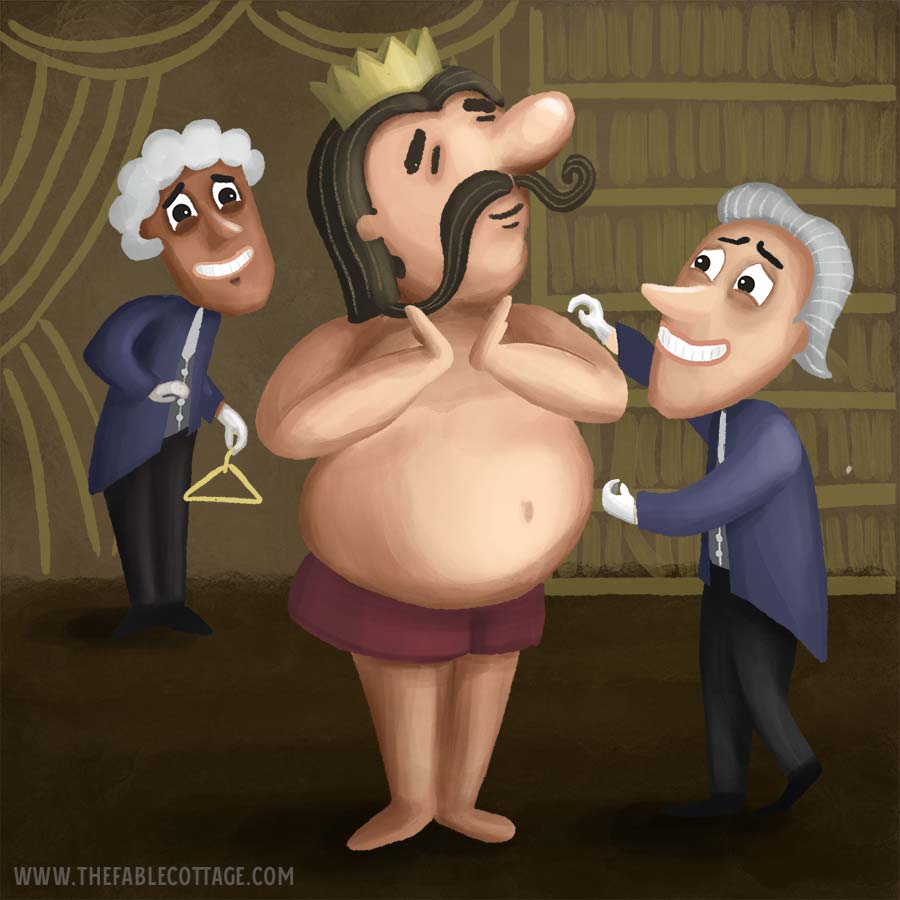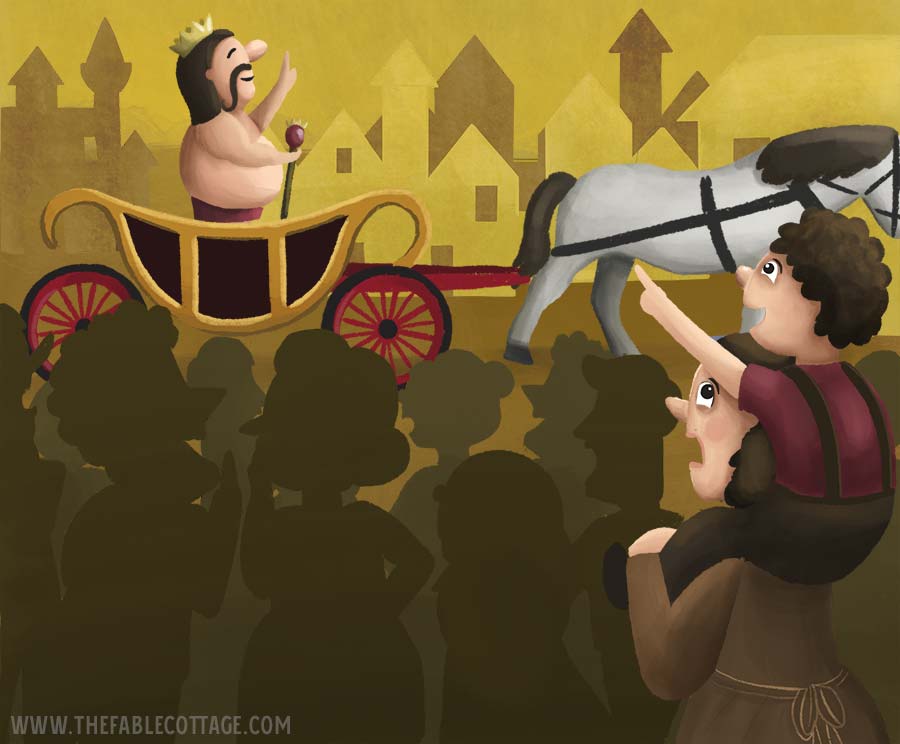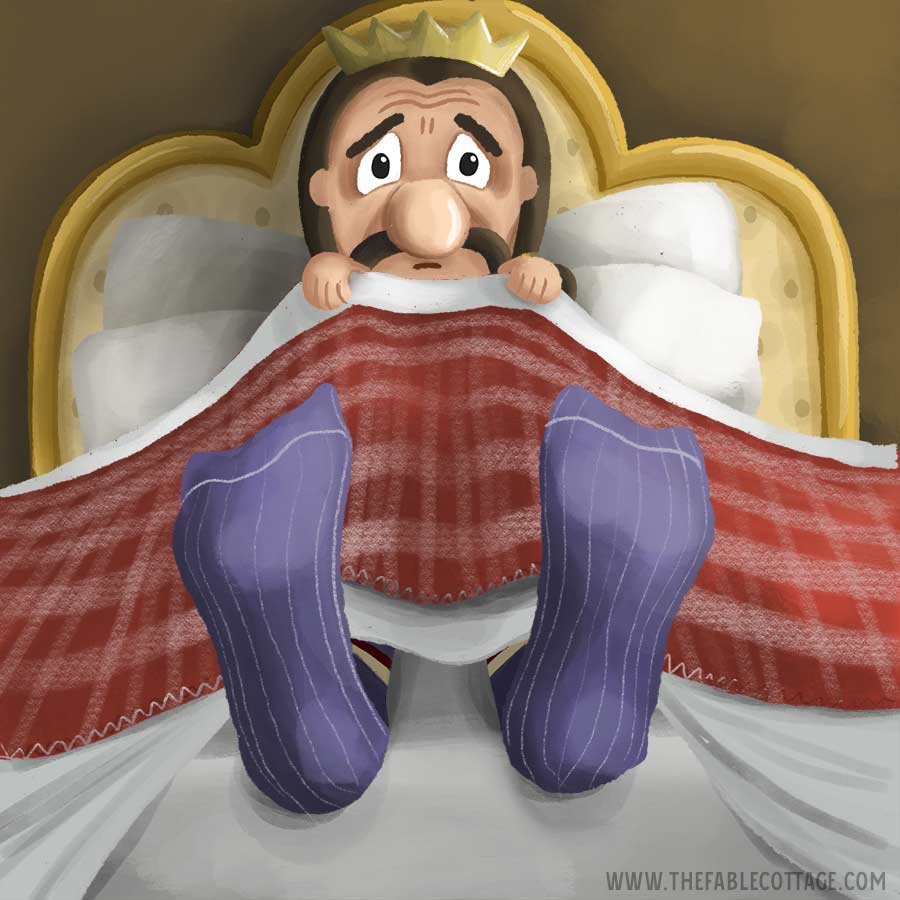Once upon a time there was an emperor. He had a big round belly, bushy eyebrows, and a very long moustache. But he was very vain. All he thought about was himself.
“I am so wonderful!” he would say. “Look at my wonderful eyebrows! Look at my excellent moustache! I look marvellous!”
The emperor loved to wear fancy clothes. He had four-hundred fancy shirts, three-hundred pairs of fancy pants, and one-thousand pairs of fancy socks.
The emperor also loved to say fancy words, like: ‘empirical’, ‘cantankerous’, and ‘discombobulate’.
(He didn’t know what the fancy words meant, but he liked to say them anyway. He liked to sound intelligent.)
“I am so INTELLIGENT!” he said. “I am a GENIUS!”
One day, a man arrived at the palace. He said that he was a tailor. He said he could make the fanciest clothes in the land.
(But really, this man was a dishonest man. He earned his money by fooling rich people.)
The tailor brought the emperor ten suitcases.
“Your most majestic and intelligent majesty...” he said. “... I am here to show you my marvellous new discovery...
“Everybody knows that you are the most intelligent man in the world. And I have created some amazing new clothes. These clothes are only for intelligent people. In fact, stupid people cannot even see these clothes...”
The emperor clapped his hands. “Amazing! With these clothes I can know who is smart and who is stupid! I will never be bothered by idiots again! Let me try these clothes!”
The tailor undressed the emperor until he stood only in his underpants. He unpacked his tape measure. He measured the emperor’s arms, legs, shoulders, and all around his big round belly.
The tailor reached inside one of the suitcases.
“No... this one is too big. No… this one is too small. Ahh! This one is perfect!”
He pretended to lift a shirt out of the suitcase.
“What do you think?” said the tailor.
The emperor gasped. He could not see anything!
“Isn’t it wonderful?” said the tailor. “And remember… only intelligent people will be able to see it!”
The tailor reached into his suitcase again. “Look at these pants! Aren’t they beautiful? And they are completely invisible to idiots! And look at this jacket! See the colours? A complete nincompoop will see absolutely nothing!”
“Oh, oh, yes… very nice!” stammered the emperor. But he was confused. Why couldn’t he see the clothes?
“Surely it’s not possible that I am an idiot?!” he thought. “A complete moron would not know fancy words like… vestibule! Crepuscular! Flibbertigibbit!”
But the emperor said nothing.
The tailor pretended to dress the emperor in the invisible shirt, pants, jacket, and shoes.
The emperor stood in front of his mirror. He wanted to see the clothes, but all he saw was his big, round belly and his underpants.
“I’m not sure that it’s really my style…” said the emperor. “But let me get a second opinion.”
The emperor called three of his most intelligent friends into the room.
“Friends! What do you think of these new clothes? Only intelligent people can see these clothes. Stupid people see nothing at all!”
Of course, his friends didn’t see anything either. But they did not want to look stupid.
“Oh, yes! That is a great shirt!” said the first friend.
“Yes! The pants are the perfect color,” said the second friend.
“Cool shoes!” said the third friend.
The emperor was excited. “I will wear these new clothes in the parade tomorrow!”
The emperor gave the tailor a lot of money. The tailor left the palace with ten suitcases full of gold. When he was safely in his carriage, he laughed long and hard.
“What a doofus!”
That night, the Emperor did not sleep. He stayed up late, reading the biggest, heaviest books in his library.
“I just need a few more fancy words, THEN I’ll be able to see my clothes,” he thought.
In the morning, two servants came to the Emperor's room to dress him for the parade.
Of course, they couldn’t see any clothes either. But they said nothing. They did not want to look stupid.
They pretended to dress the emperor in invisible pants, invisible shirt, invisible jacket, and an invisible hat.
The emperor looked at himself in the mirror. He stared and he squinted. He turned his head left and right.
And … wait… there it was!
Out of the corner of his eye, he thought he saw a slight shimmering fabric. A checkered pattern. A tiny bit of colour. He could see the clothes!
(In reality, there were no clothes. But we often see what we want to see.)
The emperor was happy that he could finally see the clothes.
“Let’s join the parade!” he shouted.
Everybody from the town was at the parade. All the intelligent people were there. All the scientists. All the writers. All the teachers. And all the children.
The emperor stood in his open carriage and waved to the crowd. But as the emperor’s carriage drove down the street, the crowd fell silent. The music stopped. Everybody stared at the emperor.
“These clothes must be amazing...” thought the emperor.
But then, from the back of the crowd, a small child yelled:
“Mummy, I can see his underpants!”
Everybody gasped. Then there were a few giggles. And then everyone on the street laughed — and laughed — and laughed even harder.
They clapped and shouted: “UN-DER-PANTS! UN-DER-PANTS!”
The emperor heard the crowd laugh. He knew he had been fooled. He wasn’t wearing special clothes. He was wearing nothing—only his underpants.
He jumped out of the carriage and ran all the way back to the palace. Behind him, he heard: “UN-DER-PANTS! UN-DER-PANTS!”
He ran to his bedroom and slammed the door.
Later, when his friends found him, he was lying on his bed. He was wearing all his real clothes: all his fancy shirts, all his fancy pants, and all one-thousand pairs of fancy socks.

Download this audio
Need help? How to download audio to your device


